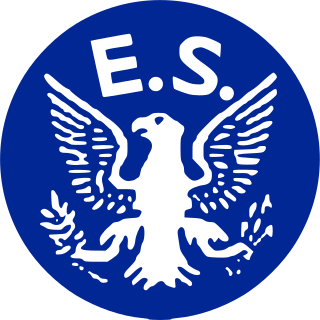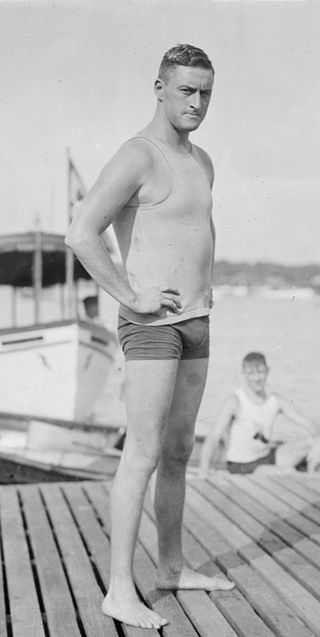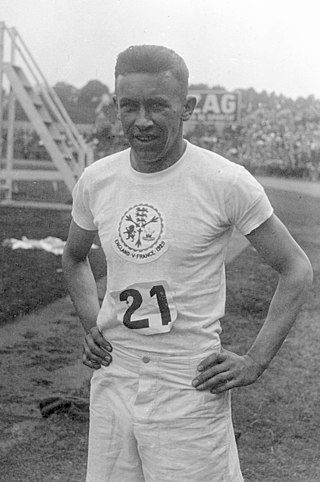
The Eagle Squadrons were three fighter squadrons of the Royal Air Force (RAF) formed with volunteer pilots from the United States during the early days of World War II (1940), prior to the United States' entry into the war in December 1941.

No. 460 Squadron is a Royal Australian Air Force intelligence unit active within the Defence Imagery and Geospatial Organisation (DIGO). It was first formed as a heavy bomber squadron during World War II on 15 November 1941 and disbanded on 10 October 1945 after seeing extensive combat over Europe. The squadron was a multinational unit, but most personnel were Australian. No. 460 Squadron was reformed on 2 July 2010 and is currently located in Canberra.

No. 41 Squadron Royal Air Force is a flying squadron of the Royal Air Force (RAF), currently operating as the Test and Evaluation Squadron (TES) for the RAF's Typhoon, presently based at RAF Coningsby in the English county of Lincolnshire in the United Kingdom. Its current official abbreviated title is 41 TES. The squadron was originally formed in April 1916, during First World War as part of the Royal Flying Corps (RFC), and served on the Western Front as a ground attack and fighter squadron. Disbanded in 1919 as part of the post-war draw down, No. 41 Squadron was re-formed as an RAF squadron in 1923, and remained on home service until 1935, when it was deployed to Aden during the Abyssinian crisis.
Frederick Anthony Owen Gaze, was an Australian fighter pilot and racing driver. He flew with the Royal Air Force in the Second World War, was a flying ace credited with 12.5 confirmed victories, and later enjoyed a successful racing career in the UK, Europe and Australia. He was the first ever Australian to take part in a Formula One Grand Prix.

William Meade Lindsley Fiske III was an American combat fighter pilot and Olympic bobsledder. At the 1928 and 1932 Winter Olympics, Fiske won gold as driver for the US bobsledding team, also acting as the American Olympic flagbearer in 1932.

USS Cooper (DD-695), was an Allen M. Sumner-class destroyer of the United States Navy.

No. 514 Squadron RAF was a bomber squadron of the Royal Air Force during the Second World War.

Group Captain Donald Osborne Finlay, DFC, AFC was a British athlete and Royal Air Force officer.
No. 625 Squadron RAF was a heavy bomber squadron of the Royal Air Force during the Second World War.

Air Vice Marshal Sir Victor Hubert Tait, was a Canadian-born soldier and airman who served with the Royal Canadian Engineers, the Royal Flying Corps, the Royal Air Force, and the Egyptian Air Force. He represented Great Britain at ice hockey in the 1928 Winter Olympics. In later life, he was an executive of BOAC.

No. 466 Squadron RAAF was a Royal Australian Air Force (RAAF) bomber squadron during World War II. Formed in the United Kingdom in late 1942, the squadron undertook combat operations in Europe until the end of the war, flying heavy bomber aircraft. Following the conclusion of hostilities with Germany, the squadron began retraining to undertake operations in the Pacific against the Japanese, but the war came to an end before it left the UK. In late 1945, the squadron was disbanded.

Leo Joseph Goodwin was an American swimmer, diver, and water polo player. He competed in the 1904 and 1908 Summer Olympics and won medals in all three disciplines.
Philip Fleming was a British merchant banker and rower who competed in the 1912 Summer Olympics.

Gordon Lindsay Thomson was an English rower who competed in the 1908 Summer Olympics for Great Britain. During the First World War, he served as a pilot in the Royal Naval Air Service and Royal Air Force.

Reginald Heber Thomas AFC was a Welsh middle-distance runner, who competed at two Olympic Games.
Robert Morgan is a retired Welsh diver, who competing for Wales and Great Britain is best known for winning a bronze and a silver medal in the men's 10 m platform at the European Championships in the early 1990s, and the first Welsh diver to win gold at the Commonwealth Games.
Rowland David George, DSO, OBE was a British rower who won gold in the 1932 Summer Olympics. As a World War II wing commander he was the only member of the Royal Air Force Equipment Branch to be awarded the Distinguished Service Order. Until his death he was the oldest surviving British Olympic gold medallist.
Thomas Clifford "Tony" Iveson DFC AE was a Royal Air Force pilot and veteran of the Second World War, and one of the Few.
William Ernest Lucas was a British RAF officer and long-distance runner who competed in the 1948 Summer Olympics. In 2017, Lucas was noted for having been Britain's oldest living Olympian.

Ingvar Fredrik Håkansson was a Swedish volunteer fighter pilot in the Royal Air Force (RAF) during the Second World War. Since Sweden was neutral in the war, Håkansson was one of few Swedes that served in RAF.











